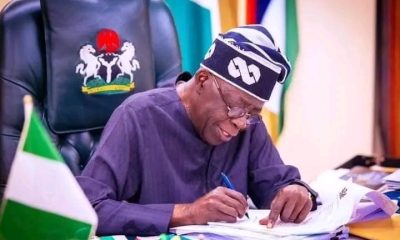News
Kenya: President Ruto Removes Petrol Subsidy, Retaines Diesel, kerosene

—- Gives Rebate To Prices Of Fertilizers,Seeds To Increase Farmers Outputs
The newly swore-in President of Kenya, William Ruto, barely three days in office, has announced the removal of petrol subsidy where that of Diesel and kerosene are retained in an attempt to safeguard already depleted state of the economy of the nation.
A decision that may seem unfriendly with some citizens particularly the motorists in the East African country.
According to a statement released on September 13, Just a day after Ruto’s was swore in, Kenya’s Energy & Petroleum Regulatory Authority said it had scrapped a subsidy on gasoline, raising the price by 13 per cent.
President Ruto in his inaugural speech also said the government had expected to spend 280 billion shillings on fuel subsidies through the end of the fiscal year in June, equivalent to what it’s budgeted for developmental projects.
A separate subsidy on corn, used to make a staple known as ugali, cost as much as 7 billion shillings in just one month, Ruto added.
However, different reactions have emanated from the people and organizations on the the latest development, some said the price-relief measure only protects those who can afford private cars while other argued that the regulator retained diesel and kerosene subsidies, helping cushion low-income earners who use the latter fuel for lighting and cooking, and rely on public transport.
In compliance with the analysis made by two different International bodies,the International Monetary Fund (IMF),who classified the country as being at high risk of debt distress, projecting the country inflation to be on track to hit double digits in the fourth quarter due to global price pressures.
Meanwhile,the Standard Chartered Bank’s London-based head of research for Africa and the Middle East,Razia Khan, has said Ruto would be facing dual tasks of stabilising government finances and bringing surging living costs under control. Kenya’s public debt ballooned to 8.6 trillion shillings ($71 billion) in June, from 1.9 trillion shillings in 2013 when the previous administration came to office.
“Rather than targeting assistance at consumers, the new administration will seek to try and reduce food production costs and increase output by subsidizing inputs such as fertilisers and quality seeds.
“As a first step, 1.4 million bags of fertiliser will be offered to farmers for 3,500 shillings each from next week, 3,000 shillings less than the current cost.
“The action on fertiliser prices and helping to boost production is sound, but cannot on its own alter very near-term developments,” Khan said.
Also, the head of research at Nairobi-based Sterling Capital Ltd.,Renaldo D’Souza outlined what seemed to be the expectations of the people from the new president and his take on petrol subsidy removal.
“We expect the president to make a few unpopular policy decisions, as much as we also expect the opposite as he attempts to keep up the promise to reduce the cost of living
“It was clear from the onset that the fuel subsidy was unsustainable in the long run,” he added.










